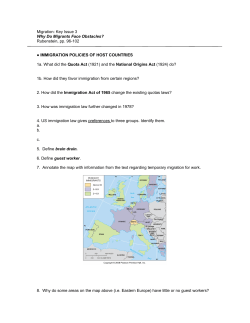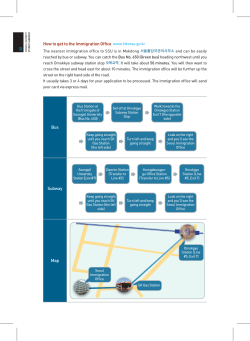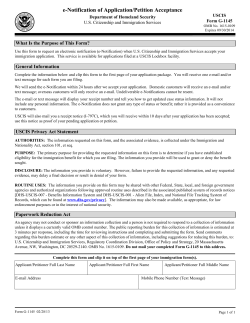
Thirteenth Report of Session 2014-15 House of Lords House of Commons
House of Lords House of Commons Joint Committee on Statutory Instruments Thirteenth Report of Session 2014-15 Drawing special attention to: Immigration Act 2014 (Specified Anti-fraud Organisation Order 2014 (S.I. 2014/1798) Diseases of Swine Regulations 2014 (S.I. 2014/1894) Ordered by the House of Lords to be printed 19 November 2014 Ordered by the House of Commons to be printed 19 November 2014 HL Paper 67 HC 332-xiii Published on 21 November 2014 by authority of the House of Lords and the House of Commons London: The Stationery Office Limited £3.50 Joint Committee on Statutory Instruments Current membership House of Lords Baroness Humphreys (Liberal Democrat) Lord Kennedy (Labour) Lord Lyell (Conservative) Baroness Mallalieu (Labour) Lord Selkirk (Conservative) Baroness Stern (Crossbench) Lord Walpole (Crossbench) House of Commons Mr George Mudie MP (Labour, Leeds East) (Chairman) Michael Ellis MP (Conservative, Northampton North) John Hemming MP (Liberal Democrat, Birmingham, Yardley) Mr Ian Liddell-Grainger MP (Conservative, Bridgwater and West Somerset) Toby Perkins MP (Labour, Chesterfield) Rt Hon Andrew Robathan MP (Conservative, South Le icestershire) Powers The full constitution and powers of the Committee are set out in House of Commons Standing Order No. 151 and House of Lords Standing Order No. 74, available on the Internet via www.parliament.uk/jcsi. H H Remit The Joint Committee on Statutory Instruments (JCSI) is appointed to consider statutory instruments made in exercise of powers granted by Act of Parliament. Instruments not laid before Parliament are included within the Committee’s remit; but local instruments and instruments made by devolved administrations are not considered by JCSI unless they are required to be laid before Parliament. The role of the JCSI, whose membership is drawn from both Houses of Parliament, is to assess the technical qualities of each instrument that falls within its remit and to decide whether to draw the special attention of each House to any instrument on one or more of the following grounds: i. that it imposes, or sets the amount of, a charge on public revenue or that it requires payment for a licence, consent or service to be made to the Exchequer, a government department or a public or local authority, or sets the amount of the payment; ii. that its parent legislation says that it cannot be challenged in the courts; iii. that it appears to have retrospective effect without the express authority of the parent legislation; iv. that there appears to have been unjustifiable delay in publishing it or laying it before Parliament; v. that there appears to have been unjustifiable delay in sending a notification under the proviso to section 4(1) of the Statutory Instruments Act 1946, where the instrument has come into force before it has been laid; vi. that there appears to be doubt about whether there is power to make it or that it appears to make an unusual or unexpected use of the power to make; vii. that its form or meaning needs to be explained; viii. that its drafting appears to be defective; ix. any other ground which does not go to its merits or the policy behind it. The Committee usually meets weekly when Parliament is sitting. Publications The reports of the Committee are published by The Stationery Office by Order of both Houses. All publications of the Committee are on the Internet at www.parliament.uk/jcsi. H H Committee staff The current staff of the Committee are Joanna Welham (Commons Clerk), Jane White (Lords Clerk) and Liz Booth (Committee Assistant). Advisory Counsel: Peter Davis, Peter Brooksbank, Philip Davies and Daniel Greenberg (Commons); Nicholas Beach, Peter Milledge and John Crane (Lords). Contacts All correspondence should be addressed to the Clerk of the Joint Committee on Statutory Instruments, 7 Millbank, London SW1P 3JA. The telephone number for general inquiries is: 020 7219 2026; the Committee’s email address is: jcsi@parliament.uk. 1 Contents Report Page Instruments reported 2 1 S.I. 2014/1798: Reported for requiring elucidation 2 2 S.I. 2014/1894: Reported for defective drafting 4 Instruments not reported 5 Annex 5 Appendix 1 7 S.I. 2014/1798: memorandum from the Home Office Appendix 2 7 7 S.I. 2014/1894: memorandum from the Department for Environment, Food and Rural Affairs 7 2 Instruments reported At its meeting on 19 November 2014 the Committee scrutinised a number of Instruments in accordance with Standing Orders. It was agreed that the special attention of both Houses should be drawn to two of those considered. The Instruments and the grounds for reporting them, are given below. The relevant Departmental memoranda are published as an appendices to this report. 1 S.I. 2014/1798: Reported for requiring elucidation Immigration Act 2014 (Specified Anti-fraud Organisation Order 2014 (S.I. 2014/1798) 1.1 The Committee draws this Order to the special attention of both Houses on the ground that it requires elucidation in one respect. 1.2 Section 13 of the Interpretation Act 1978 provides, so far as is relevant, as follows: “Where an Act which (or any provision of which) does not come into force immediately on its passing confers power to make subordinate legislation, … then, unless the contrary intention appears, the power may be exercised, and any instrument made thereunder may be made so as to come into force, at any time after the passing of the Act so far as may be necessary or expedient for the purpose— (a) of bringing the Act or any provision of the Act into force; or (b) of giving full effect to the Act or any such provision at or after the time when it comes into force.”. 1.3 It follows that – (a) in any case where a provision of an Act is actually incomplete (in the sense of not being capable of working) without delegated legislation under it being in force, bringing everything into force together is necessary for full effect; (b) given that what is expedient goes further than what is necessary, delegated legislation made in reliance on section 13 and not derogating from the Act under which it is made can contain extras – see USHER v BARLOW (1952 1Ch 255), in which Jenkins LJ describes, as coming within what counts as ‘expedient’, matters ‘without which the Act can come into operation, but with which the Act will come into operation more conveniently or effectively’ and refers to the equivalent of the time when an Act comes into force as ‘the date fixed or prescribed as the time’ at which it does so. So the scope of what can be included in an instrument relying on section 13 and coming into force on or after the date at which the enabling power comes into force is reasonably wide. 1.4 In this case the Immigration Act 2014 received Royal Assent on 14th May 2014. Section 40, subsection (4) of which is cited as the enabling power in the preamble to this Order, provides that a bank or building society must not open a current account for a person who 3 is present in the United Kingdom and who requires leave to enter or remain in the United Kingdom but does not have it, unless it has first carried out a status check with a body, specified by order under the section, and the check indicates that the individual is not a “disqualified person”. This Order specifies CIFAS as that body. The Committee recognises that, on the above analysis, it is not just expedient but also necessary for this Order to come into force when section 40 of the Immigration Act 2014 does so. However the Committee is not aware of any case law on the availability of section 13 to justify inclusion of provision for the coming into force of an instrument before its enabling power comes into force. Here – (a) the Immigration Act 2014 (Commencement No. 2) Order (S.I. 2014/1943), made on 22nd July 2014, provided for section 40 of the Immigration Act 2014 to come into force on 12th December 2014, but (b) this Order, made on 8th July 2014, is stated to come into force on 2nd August 2014. 1.5 The Committee was therefore puzzled as to how it could be either necessary or expedient, to give full effect to section 40 on and after 12th December 2014, for this Order to contain a coming into force date over four months earlier, when in the meantime it could have no legal effect at all. It therefore asked the Home Office how there was power to bring this Order into force in advance of section 40. 1.6 In a memorandum printed at Appendix 1, the Department in effect applies the convenience ground to justify the application of section 13. It explains that “the principal purpose of specifying the anti-fraud organisation over four months in advance of the coming into force date of the enabling provision was to provide certainty for financial providers seeking to put arrangements in place in preparation for commencement”. The memorandum gives additional explanation of potential practical inconvenience that could have been caused to financial institutions if they had not had the certainty provided by the Order. 1.7 Having regard to the desirability of providing this certainty, the Department explains that it “considers that specifying CIFAS at this stage in the process was a step necessary to set up the machinery to bring the Act into force”. The Department goes on to explain how this conclusion leads it to believe that anticipatory exercise was available under section 13 of the Interpretation Act 1978. The Department “acknowledges that a more usual reliance on section 13 of the Interpretation Act involves exercising an enabling power so as to make provision which comes into force at the same time as the enabling power is itself brought into force, rather than some months before” and “accepts that its approach to making S.I. 2014/1978 was therefore not in accordance with best practice”. But it submits that, on a strict reading, “section 13 does not stipulate the time when the enabling power must itself be brought into force, and instead permits the anticipatory exercise of a power as long as the exercise of the power is necessary or expedient for the purposes specified”. 1.8 The Committee agrees that the wording of section 13 does not in terms prevent an instrument under an enabling power from including a coming into force date earlier than the date of coming into force of the power itself and is prepared to accept, on the basis of the arguments in the Department’s memorandum, that a full explanation would be capable 4 of showing the expediency required for section 13 of the 1978 Act to apply in this case. It notes however that, had the Department waited a fortnight before making this Order, the date of commencement of section 40 would have been settled and so this Order could have contained the same coming into force date as that commencement and achieved significantly greater certainty, only with a known period of a bit less than four months as the lead-in period rather than an unclear period that later turned out to be a bit more than four months. Nothing in the Explanatory Note or the Explanatory Memorandum indicates that this Order could not impose any obligation until section 40 was in force and that the date of that was uncertain at the time this Order was made. A reader, unaware of the background, could thus easily have assumed that obligations under the Order were indeed imposed on 2nd August 2014. These factors should, in the Committee’s view, have been addressed in a justification that stresses achievement of certainty as significant in demonstrating power to make the Order. 1.9 Accordingly, the Committee reports this Order on the grounds that, in so far as it is stated to come into force before the power it was made under does so, it requires elucidation not fully provided in the Department’s memorandum. 2 S.I. 2014/1894: Reported for defective drafting Diseases of Swine Regulations 2014 (S.I. 2014/1894) 2.1 The Committee draws the special attention of both Houses to these Regulations on the ground that they are defectively drafted in one respect. 2.2 The Regulations make provision setting out powers to deal with various diseases suffered by pigs. The Regulations confer certain enforcement functions on, and on inspectors appointed by, a local authority. “Local authority” is defined in regulation 2(1). In paragraph (a) of the definition (which applies to England) sub-paragraph (i) provides that, where there is an authority which is the sole principal council for an area, that authority is the local authority, and it defines such an authority as “a unitary authority”. Sub-paragraph (ii)(aa) provides that “where there is not a unitary authority”, in a metropolitan district “local authority” means the council of the district. 2.3 Because section 1 of the Local Government Act 1985 abolished metropolitan county councils the Committee wondered why a metropolitan district council was not a unitary authority (and so within sub-paragraph (i) of paragraph (a) of the definition) as being the sole principal council for the area of the metropolitan district, thereby making subparagraph (ii)(aa) of the definition apparently unnecessary. It accordingly asked the Department for Environment, Food and Rural Affairs to explain the need for that provision. 2.4 In a memorandum printed at Appendix 2, the Department acknowledges that metropolitan district councils are unitary authorities as defined and therefore do not need separate mention in the definition. It undertakes to reconsider the definition of “local authority” at the next available opportunity. 2.5 Accordingly, the Committee reports the definition of “local authority” in regulation 2(1) for defective drafting, acknowledged by the Department. 5 Instruments not reported At its meeting on 19 November 2014 the Committee considered the Instruments set out in the Annex to this Report, none of which were required to be reported to both Houses. Annex Draft Instruments requiring affirmative approval Draft S.I. Contracting Out (Vehicle Certification and Related Functions) Order 2014 Draft S.I. Compensation (Claims Management Services) (Am endment) Regulations 2015 Draft S.I. Legal Aid, Sentencing and Punishment of Offenders Act 2012 (Amendment of Schedule 1) (Advocacy Exceptions) Order 2014 Draft S.I. Legal Services Act 2007 (Cl aims Management Complaints) (Fees) Regul ations 2014 Draft S.I. Public Bodies (Abolition of the Library Advisory Council for England) Order 2014 Draft S.I. Government of Wales Act 2006 (Am endment) Order 2015 Draft S.I. Keeping and Introduction of Fish (England and River Esk Catchment Area) Regulations 2015 Draft S.I. Misuse of Drugs Act 1971 (Amendm ent) (No. 2) Order 2014 Draft S.I. Electricity Capacity (Supplier Payment etc.) Regul ations 2014 Draft S.I. Transfer of Tribunal Functions (Transport Tribunal) Order 2014 Instruments subject to annulment S.I. 2014/2670 Care and Support and After-care (Choice of Accommodation) Regulations 2014 S.I. 2014/2672 Care and Support (Charging and Assessment of Resources) Regulations 2014 S.I. 2014/2673 Care and Support (Preventing Needs for Care and Support) Regulations 2014 S.I. 2014/2704 Offender Management Act 2007 (Dissolution of Probation Trusts) Order 2014 S.I. 2014/2708 Transfer of Functions (Chequers and Dorneywood Estates) Order 2014 S.I. 2014/2712 Agricultural Holdings (Units of Production) (England) Order 2014 S.I. 2014/2715 Mobile Roaming (European Communities) (Amendm ent) Regulations 2014 S.I. 2014/2720 Dover Harbour Revision Order 2014 S.I. 2014/2735 Jobseeker’s Allowance (Habitual Residence) Amendm ent Regulations 2014 S.I. 2014/2746 Social Security Class 3A Contributions (Amendment) Regulations 2014 6 S.I. 2014/2748 Official Feed and Food Controls (England) and the Food Safety and Hygiene (England) (Amendm ent) Regulations 2014 S.I. 2014/2761 Immigration (European Economic Area) (Amendm ent) (No. 3) Regulations 2014 S.I. 2014/2793 Rail Passengers’ Rights and Obligations (Exemptions) Regul ations 2014 S.I. 2014/2816 Immigration (Removal of Family Members) Regulations 2014 S.I. 2014/2825 Care and Support (Continuity of Care) Regulations 2014 S.I. 2014/2847 Immigration Services Commissioner (Application Fee) (Amendm ent) Order 2014 S.I. 2014/2852 Environmental Permitting (England and Wales) (Amendment) (England) Regulations 2014 S.I. 2014/2854 Care and Support (Sight-impaired and Severely Sightimpaired Adults) Regulations 2014 S.I. 2014/2864 Community Legal Service (Funding) (Counsel in Family Proceedings) (Amendment) Order 2014 S.I. 2014/2865 Feed-in Tariffs (Amendm ent) (No. 2) Order 2014 S.I. 2014/2867 Local Justice Areas (No. 3) Order 2014 S.I. 2014/2873 Immigration (Residential Accommodation) (Prescribed Cases) Order 2014 S.I. 2014/2874 Immigration (Residential Accommodation) (Prescribed Requirements and Codes of Practice) Order 2014 S.I. 2014/2887 Universal Credit (Digital Service) Amendm ent Regulations 2014 S.I. 2014/2888 Universal Credit and Miscellaneous Amendm ents (No.2) Regulations 2014 S.I. 2014/2890 Producer Responsibility Obligations (Packaging Waste) (Amendment) Regulations 2014 Instruments not subject to Parliamentary proceedings not laid before Parliament S.I. 2014/2727 Pensions Act 2014 (Commencem ent No. 3) Order 2014 S.I. 2014/2771 Immigration Act 2014 (Comm encement No. 3, Transitional and Saving Provisions) Order 2014 S.I. 2014/2754 Anti-soci al Behaviour, Crime and Policing Act 2014 (Commencement No. 7, Saving and Transitional Provisions) (Amendm ent) Order 2014 S.I. 2014/2844 North Staffordshire Hospital Centre National Health Service Trust (Change of Name) (Establishment) Am endment Order 2014 7 Appendix 1 S.I. 2014/1798: memorandum from the Home Office Immigration Act 2014 (Specified Anti-fraud Organisation Order 2014 (S.I. 2014/1798) 1. The Committee have requested the following: “Explain the need for paragraph (a)(ii)(aa) of the definition of “local authority” in regulation 2(1) given that, as a result of section 1 of the Local Government Act 1985, a metropolitan district council appears to fall within the definition of a unitary authority in paragraph (a)(i) of that definition.” 2. The department acknowledges that the metropolitan district councils in England are all now unitary authorities and therefore that term should not have been mentioned within the definition of “local authority” for England in regulation 2(1) of these Regulations. As this does not affect the enforcement of these Regulations because all metropolitan districts are now unitary authorities, the department will reconsider the definition of local authority in England at the next available opportunity. Department for Environment, Food and Rural Affairs 4 November 2014 Appendix 2 S.I. 2014/1894: memorandum from the Department for Environment, Food and Rural Affairs Diseases of Swine Regulations 2014 (S.I. 2014/1894) 1. The Committee has requested a Memorandum on the following point: Given that the provision under which this Order is stated to made comes into force on 12 December 2014 by virtue of S.I. 2014/1943, which itself was made 16 days after this Order was made, explain in the light of the wording of section 13 of the Interpretation Act 1978 why it was considered that there was power to make this Order at the time it was made and to bring it into force over four months before the coming into force date of the enabling provision. 8 2. S.I. 2014/1798 specifies CIFAS as the specified anti-fraud organisation with which a bank or building society seeking to open a current account for someone must undertake a status check to establish whether or not that person is a “disqualified person” for the purposes of this provision. It was made on 8 th July, laid on 11th July and came into force on 2nd August 2014. Commencement Order 2014/1943, specifying a commencement date of 14th December 2014, was made on 22nd July. Directly afterwards, HM Treasury laid secondary legislation subject to the affirmative procedure, which set out the detail of the enforcement and monitoring regime to be operated by the Financial Conduct Authority and clarifying the extent of the checking requirement imposed on banks and building societies specifying this commencement date before recess for debate in both Houses in the Autumn. 3. The principal purpose of specifying the anti-fraud organisation over four months in advance of the coming into force date of the enabling provision was to provide certainty for financial providers seeking to put arrangements in place in preparation for commencement. In particular, although an assurance had been given by the Government that CIFAS would be specified during the passage of the Immigration Act, the legislation allowed for alternative organisations to be specified. For the majority of banks, specification of a different provider would have necessitated significant technological change and expenditure in order to comply with their statutory obligations. Further, some smaller providers did not previously use CIFAS for their compliance checks and therefore needed sufficient notice to establish these arrangements. It was therefore considered necessary to specify CIFAS at an early stage. 4. Had CIFAS been specified at a later stage closer to the commencement data, the regime could also (at least for a period following commencement) have been rendered ineffective in respect of some providers. This is because one exception to the section 40 prohibition on opening an account for a disqualified person is that at the time when the account is opened they cannot (because of circumstances that cannot reasonably be regarded as within their control) carry out a status check. Such an exception might well apply to a provider who had not had confirmation of who the specified anti-fraud organisation was at a sufficiently early stage to enable them to make arrangements to put the checking mechanism in place. 5. The Home Office considers that specifying CIFAS at this stage in the process was a step necessary to set up the machinery to bring the Act into force. Giving the banks and building societies advance notice of who the relevant provider will be helps to ensure that the provision will come into force more effectively and that all effective providers will be ready to implement the regime on the specified “going live” date. The banks and building societies affected by the new prohibition had placed reliance on the Government’s assurances that the detail 9 of the new scheme would be confirmed at a sufficiently early stage to enable them to make preparations for commencement and this included the specification of CIFAS. 6. Accordingly, the Home Office concluded that it was possible to make S.I. 2014/1798, even though its enabling power had not yet been commenced, in reliance on section 13 of the Interpretation Act 1978. The Immigration Act 2014 is an Act “which does not come into force immediately on its passing”, and it “confers power to make subordinate legislation”. That power could therefore be exercised “at any time after the passing of the Act”, to the extent that it was expedient for the purposes of bringing section 40 into force, and of giving full effect to the Act. 7. The Home Office acknowledges that a more usual reliance on section 13 of the Interpretation Act involves exercising an enabling power so as to make provision which comes into force at the same time as the enabling power is itself brought into force, rather than some months before. The Home Office accepts that its approach to making S.I. 2014/1978 was therefore not in accordance with best practice. But it is submitted that on a strict reading, section 13 does not stipulate the time when the enabling power must itself be brought into force, and instead permits the anticipatory exercise of a power as long as the exercise of the power is necessary or expedient for the purposes specified. Home Office 28 October 2014
© Copyright 2025









